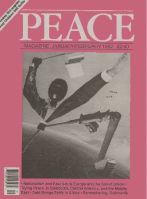
Peace Magazine Jan-Feb 1992, page 6. Some rights reserved.
Search for other articles by Shirley Farlinger here
It started as a holiday and ended as a peace mission.
Sweden has been, a trading and therefore warring area from early times. Source of the Nobel Peace Prize, Sweden has a history of strong allegiance to the U.N. principles of disarmament. Stockholm is home to SIPRI, the Swedish International Peace Research Institute, whose twenty-fifth birthday celebration I couldn't resist attending.
It began on November 12 with the Olaf Palme Memorial Lecture, given by Sir Shridath Surendranath Ramphal-thankfully referred to as Sonny. He was the first Third World head of the Commonwealth, member of the Brandt Commission and twice Vice-President of the U.N. General Assembly. His speech kicked off the birthday celebrations and a conference called Common Security and the Rule of Law: What Have We learned?
Sonny's speech was good, though I wondered how he could cover the state of the world in 1991 and hardly criticize the U.S. His few criticisms were, however, well put. With the Americans going into Grenada and Panama, the Soviets into Afghanistan, and Israel in the West Bank, he asked "Is it any wonder that Saddam Hussein believed aggression against a small neighbor was allowable?"
Looking towards the fiftieth anniversary of the U.N. he spoke of the need to establish the worldwide rule of "law that does not accept that any country, however mighty. ..can be accuser, policeman, judge, jury and prison warden all in one."
"We need a global 911 system ... Kuwait could have dialed for help ... an international fact-finding mission and international observers could have been in Kuwait in 24 hours," he added.
He invited his audience, which included Sir Brian Urquhart and Oscar Arias, to reflect on "how fragile are the blooms of peace and prosperity" in a world "poised between a civilized society governed by law and an ordered world of militarism enforcing selective solitudes."
All this was delivered in the Grand Hotel, which more than lives up to its name: red-carpeted staircases, gold curlicues outlining mirrored walls, blue and white nymphs floating on the ceilings. We sat in plush chairs and sipped champagne after the speeches.
SIPRI receives $5 million a year from the government, though other peace groups struggle along as in Canada. I visited a number of them, who share quarters in Halsans Hus, a former hospital. Cooperation for Peace runs Peacequest exchange tours, and from the sounds of the young people down the hall they have a good time.
SIPRI is famous for its annual report, which counts weapons. Technologies such as fibre optics and software, which have dual uses and are therefore hard to evaluate militarily, have recently been included. A case in point are the imaging platforms which they said made victory over Iraq "assured and relatively painless." I guess Iraqis don't feel pain.
Soon I was struggling with another language: acronym-speak. See how many you can get (answers listed below): "Many NTM resources will go to the ThNCAP program which costs $1 billion a year. It helped Gulf commanders get intelligence in near-real time. By 1992 the U.S will have BICES, C3i technologies. Iraqi weapons were targeted with JSTARS, good also for CFE Treaty verifications."
Does the speaker, Richard Kokoski, approve or disapprove of all the hardware he has been describing? He doesn't do either, he just counts.
As I . my pile of conference documents home I heartily agree with Steven Miller, a former SIPRI researcher, who says "the vast bureaucracies producing documents that look and read like telephone books are not adequate for today."
According to a SIPRI source who requested anonymity the following came out of the conference: SIPRI information is valuable and should continue but the timeline of one year is too slow; background information must be combined with current events; research is needed on dispute settlement mechanisms; military doctrines, force structures and politics should be broadened to include environmental destruction by war.
There is also a prediction that the $5 million a year budget might be cut by the government and so there will be a need to prioritize. These fears no doubt exist because Carl Bildt, of the centre-right moderate party, won the latest elections. But the new government got only 22% of the vote, and in any case the cabinet includes members from all the major parties, so it is expected that changes will not be drastic.
After the conference one dark night darkness sets in at 3:30 in the afternoon this time of year- I visit the graveyard where Olaf Palme was buried in 1986, International Year of Peace, and where red roses are still placed by admirers. Then in the huge cathedral in Uppsala, where organ chords reverberate up to the blue and gold Gothic heights, I light a candle on the Tree of Peace, a memorial to another famous Swede, Dag Hammarskjold. While Secretary-General of the U.N., he was killed inaction. I slip out into the frozen fog hoping that Sweden will continue to light our way to peace and not be enveloped in the darkness that is creeping over our world.
Copies of SIPRI papers are available from the author.
Shirley Farlinger is a peace activist and an editor of Peace Magazine.

Peace Magazine Jan-Feb 1992, page 6. Some rights reserved.
Search for other articles by Shirley Farlinger here